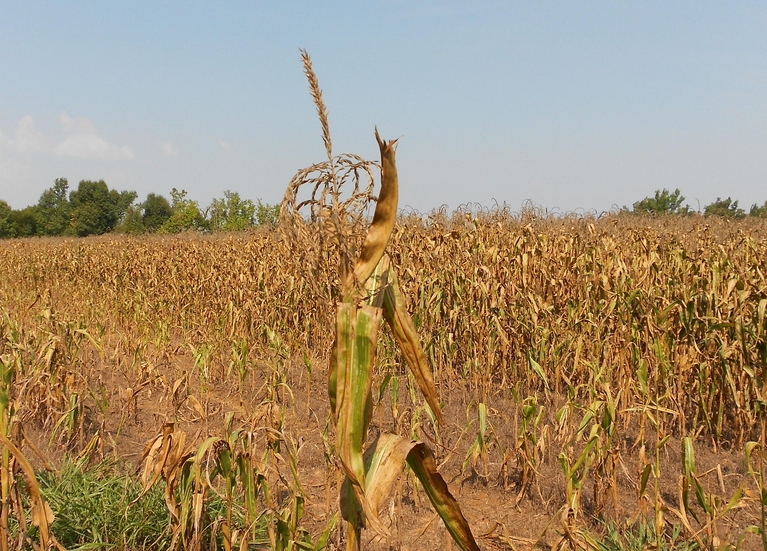Podcast: Play in new window | Download
Subscribe: RSS

Drought-stressed corn, maybe also toxic, bug-bit and weed-plagued, in Kentucky last summer. (Photo by CraneStation/Flickr)
A new US Department of Agriculture report looking only at the threat of climate change implies that industrial agriculture will be on its knees in 25 years. “We’re going to end up in a situation where we have a multitude of things happening that are going to negatively impact crop production,” said Jerry Hatfield, lead author of the study. “In fact, we saw this in 2012 with the drought.” Ever the cheerleader for industrial agriculture, the USDA insists that corporate farmers will be fine for a couple dozen years as long as they increase irrigation, use genetically modified, drought-resistant seeds — and move.
After that time frame, however, the USDA report — the third annual Climate Assessment Report, just released in draft form for public review — throws up its hands and admits that escalating temperatures will stunt crops, reduce yields, stimulate weeds and insects, overheat food animals, foster disease and — worst of all — reduce profitability. In other words, it will be the end of the world as they know it. Okay, that’s snide. The report states flatly that within 25 years the cumulative effects of global warming will become “a threat to the security of the United States.”
The report [summarized in USA Today] is remarkable on two counts. First, of course, is that the cheerleaders are losing their cheery confidence that we will somehow win this game. Second is how pessimistic they become when looking at only one set of threats. According to the report, one way to fight climate change, which already has half the country locked in a vicious drought, is to increase irrigation. Right. And their likely advice to the millions who will be starving when the water runs out and the crops fail: you should eat more.
What about topsoil loss, which continues to accelerate despite billions spent on conservation half-measures? What about the rise of pesticide-resistant weeds, bugs and bacteria? What about the poisoning of rivers and lakes, and the dead zones in the oceans? Add all these effects to the report’s slender survey and it’s hard to imagine getting through 25 years before it gets serious.
Still, can we expect Big Ag to change its ways now that its own team has issued a report as brutal in its outlook as this one? Hardly. Because the same government that paid for the report gives them cheap insurance against crop failure. Cheap crop insurance — like cheap flood insurance — is a product so ruinous to the insurer that no private company will touch it.
The government, however, offers Revenue Protection, which pays a grower for the crop that failed at the high prices caused by the crop failure. Thus corn crops insured last spring when it was bringing $5.68 per bushel paid off this fall at $7.50 for every bushel not harvested. Drought claims are pushing crop insurance claims to $15 billion this year. They totaled less than $3 billion just a decade ago. As long as this continues, and failed crops are worth as much as harvested crops to the growers, what is the motivation for wrenching change? The security of the country, and the earth’s huddled masses? Please.
Not fair. Can’t find the report… got a link?
Sorry. Here it is:
http://ncadac.globalchange.gov/
Don’t mean to appear as if I’m jesting at the whole situation, but I feel inspired to introduce a work of music here that would seem to me aptly to capture the mood of our collective plight. Vaughan Williams’ 6th Symphony is a dark, stormy work which has been dubbed a ‘War Symphony’ (though the composer himself objected to this description); the slow, quiet and moody final movement in particular is a veritable landscape painting in the form of sound depicting in my imagination some post-apocalyptic world bereft of life…
I appreciate your sensitivity as always, but just want to register with you my view that the post-apocalyptic world will hardly be bereft of life. I believe what is coming is an evolutionary event that will cauterize the world and its civilizations, leaving the practitioners of sustainability to try once again to flourish without sinking the boat they are sailing. I think we’re going to keep doing this until we get it right. So let’s play the third movement from San Saens’ Organ Concerto and be of good cheer.